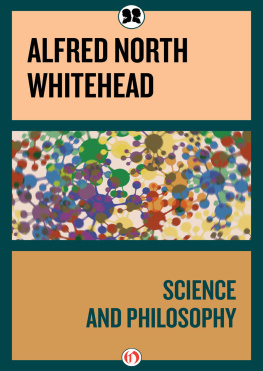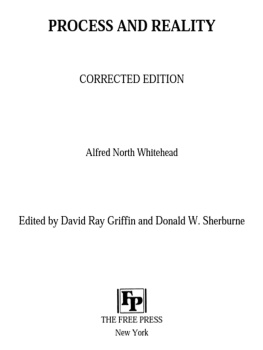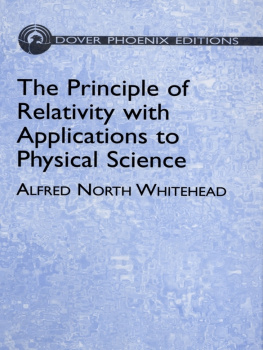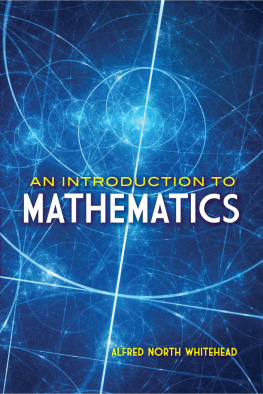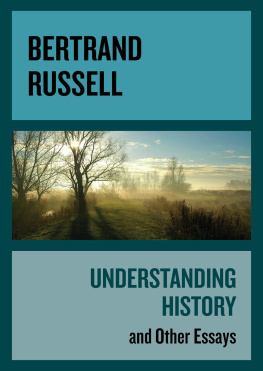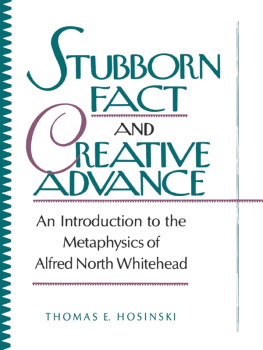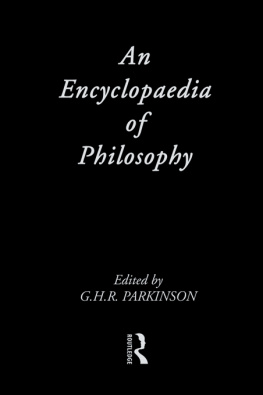Science and Philosophy
Alfred North Whitehead

Contents
Part I
Personal
Autobiographical Notes
I was born in 1861, February 15, at Ramsgate in the Isle of Thanet, Kent. The family, grandfather, father, uncles, brothers engaged in activities concerned with education, religion and Local Administration: my grandfather, born of yeoman stock in Isle of Sheppey, was probably a descendant of the Quaker George Whitehead, whom George Fox in his Journal mentions as living there in the year 1670. In the year 1815, my grandfather, Thomas Whitehead, at the age of twenty-one, became head of a private school in Ramsgate, Isle of Thanet, to which my father, Alfred Whitehead, succeeded at the correspondingly early age of twenty-five, in the year 1852. They were, both of them, most successful schoolmasters, though my grandfather was by far the more remarkable man.
About 1860 my father was ordained as a clergyman of the Anglican Church; and about 1866 or 1867 he gave up his school for clerical duty, first in Ramsgate, and later in 1871 he was appointed Vicar of St. Peters Parish, a large district mostly rural, with its church about two or three miles from Ramsgate. The North Foreland belongs to the parish. He remained there till his death in 1898.
He became influential among the clergy of East Kent, occupying the offices of Rural Dean, Honorary Canon of Canterbury, and Proctor in Convocation for the Diocese. But the central fact of his influence was based on his popularity with the general mass of the population in the Island. He never lost his interest in education, and daily visited his three parochial schools, for infants, for girls, and for boys. As a small boy, before I left home for school in 1875, I often accompanied him. He was a man with local interests and influence; apart from an understanding of such provincial figures, the social and political history of England in the nineteenth century cannot be comprehended. England was governed by the influence of personality: this does not mean intellect.
My father was not intellectual, but he possessed personality. Archbishop Tait had his summer residence in the parish, and he and his family were close friends of my parents. He and my father illustrated the survival of the better (and recessive) side of the eighteenth century throughout its successor. Thus, at the time unconsciously, I watched the history of England by my vision of grandfather, father, Archbishop Tait, Sir Moses Montefiore, the Pugin family, and others. When the Baptist minister in the parish was dying, it was my father who read the Bible to him. Such was England in those days, guided by local men with strong mutual antagonisms and intimate community of feeling. This vision was one source of my interest in history, and in education.
Another influence in the same direction was the mass of archological remains with their interest and beauty. Canterbury Cathedral with its splendour and its memories was sixteen miles distant. As I now write I can visualize the very spot where Becket fell A.D. 1170, and can recall my reconstruction of the incident in my young imagination. Also there is the tomb of Edward, The Black Prince (died A.D. 1376).
But closer to my home, within the Island or just beyond its borders, English history had left every type of relic. There stood the great walls of Richborough Castle built by the Romans, and the shores of Ebbes Fleet where the Saxons and Augustine landed. A mile or so inland was the village of Minster with its wonderful Abbey Church, retaining some touches of Roman stonework, but dominated by its glorious Norman architecture. On this spot Augustine preached his first sermon. Indeed the Island was furnished with Norman, and other medival churches, built by the Minster monks, and second only to their Abbey. My fathers church was one of them, with a Norman nave.
Just beyond Richborough is the town of Sandwich. At that time it retained the sixteenth and seventeenth centuries, with its Flemish houses lining the streets. Its town-records state that in order to check the silting up of the harbour, the citizens invited skilful men from the Low Countriescunning in waterworks. Unfortunately they failed, so that the town remained static from that period. In the last half century, it has been revived by a golf course, one of the best in England. I feel a sense of profanation amidst the relics of the Romans, of the Saxons, of Augustine, the medival monks, and the ships of the Tudors and the Stuarts. Golf seems rather a cheap ending to the story.
At the age of fourteen, in the year 1875, I was sent to school at Sherborne in Dorsetshire, at the opposite end of southern England. Here the relics of the past were even more obvious. In this year (1941) the school is to celebrate its twelve-hundredth anniversary. It dates from St. Aldhelm, and claims Alfred the Great as a pupil. The school acquired the monastery buildings, and its grounds are bounded by one of the most magnificent Abbeys in existence, with tombs of Saxon princes. In my last two years there the Abbots room (as we believed) was my private study; and we worked under the sound of the Abbey bells, brought from the Field of The Cloth of Gold by Henry VIII.
I have written thus far in order to show by example how the imaginative life of the southern English professional class during the last half of the nineteenth century was moulded. My own experience was not in the least bit exceptional. Of course details differ, but the type was fairly uniform for provincial people.
This tale has another reference to the purpose of this slight autobiography. It shows how historical tradition is handed down by the direct experience of physical surroundings.
On the intellectual side, my education also conformed to the normal standard of the time. Latin began at the age of ten years, and Greek at twelve. Holidays excepted, my recollection is that daily, up to the age of nineteen and a half years, some pages of Latin and Greek authors were construed, and their grammar examined. Before going to school pages of rules of Latin grammar could be repeated, all in Latin, and exemplified by quotations. The classical studies were interspersed with mathematics. Of course, such studies included historynamely, Herodotus, Xenophon, Thucydides, Sallust, Livy, and Tacitus. I can still feel the dullness of Xenophon, Sallust, and Livy. Of course we all know that they are great authors; but this is a candid autobiography.
The others were enjoyable. Indeed my recollection is that the classics were well taught, with an unconscious comparison of the older civilization with modern life. I was excused in the composition of Latin Verse and the reading of some Latin poetry, in order to give more time for mathematics. We read the Bible in Greek, namely, with the Septuagint for the Old Testament. Such Scripture lessons, on each Sunday afternoon and Monday morning, were popular, because the authors did not seem to know much more Greek than we did, and so kept their grammar simple.
We were not overworked; and in my final year my time was mostly occupied with duties as Head of the School with its responsibility for discipline outside the class-rooms, on the Rugby model derived from Thomas Arnold, and as Captain of the Games, chiefly cricket and football, very enjoyable but taking time. There was however spare time for private reading. Poetry, more especially Wordsworth and Shelley, became a major interest, and also history.

